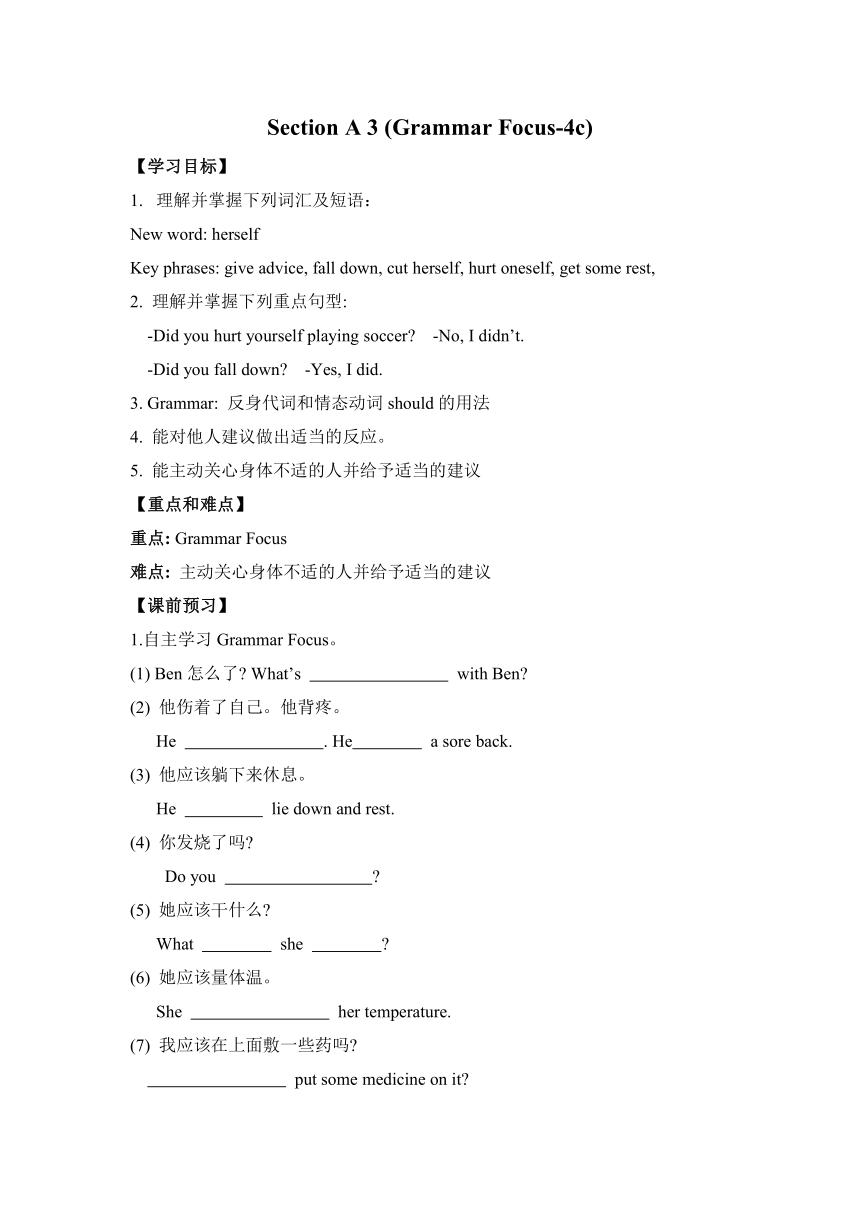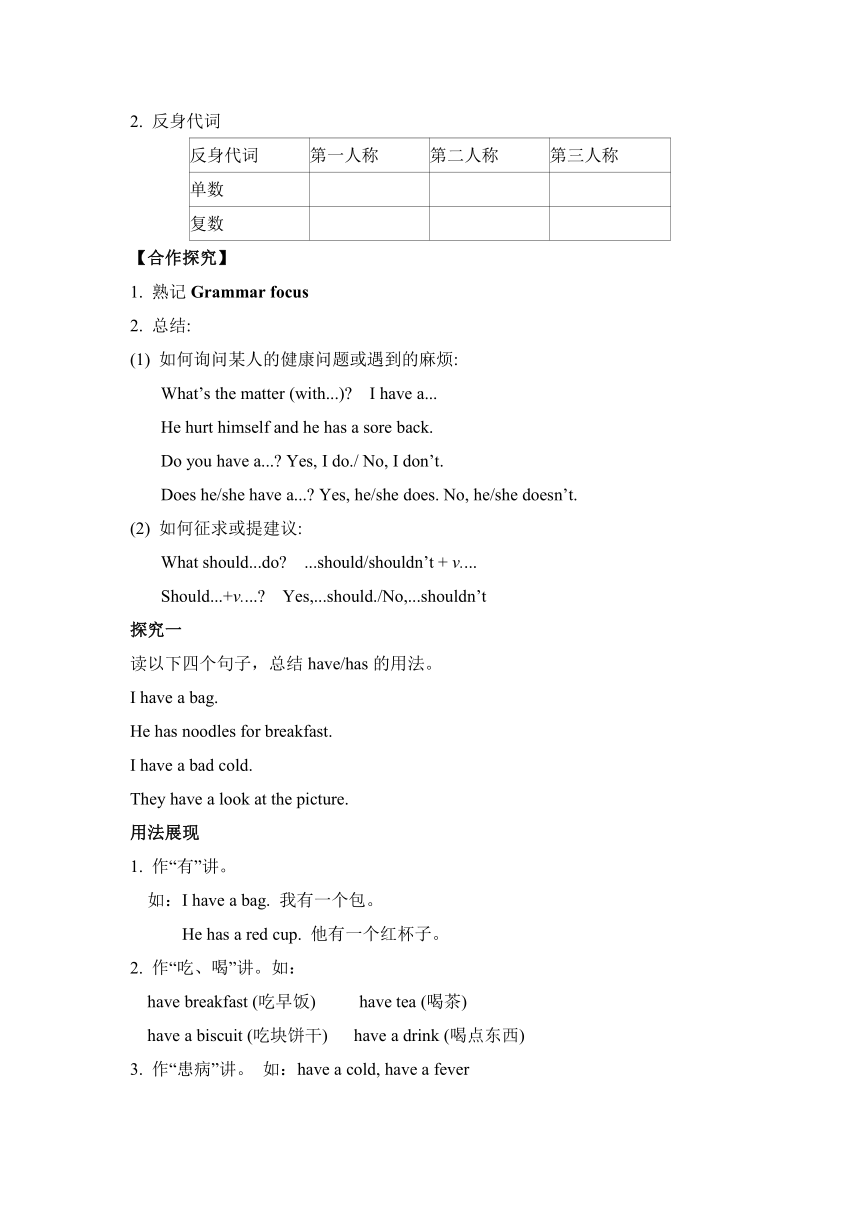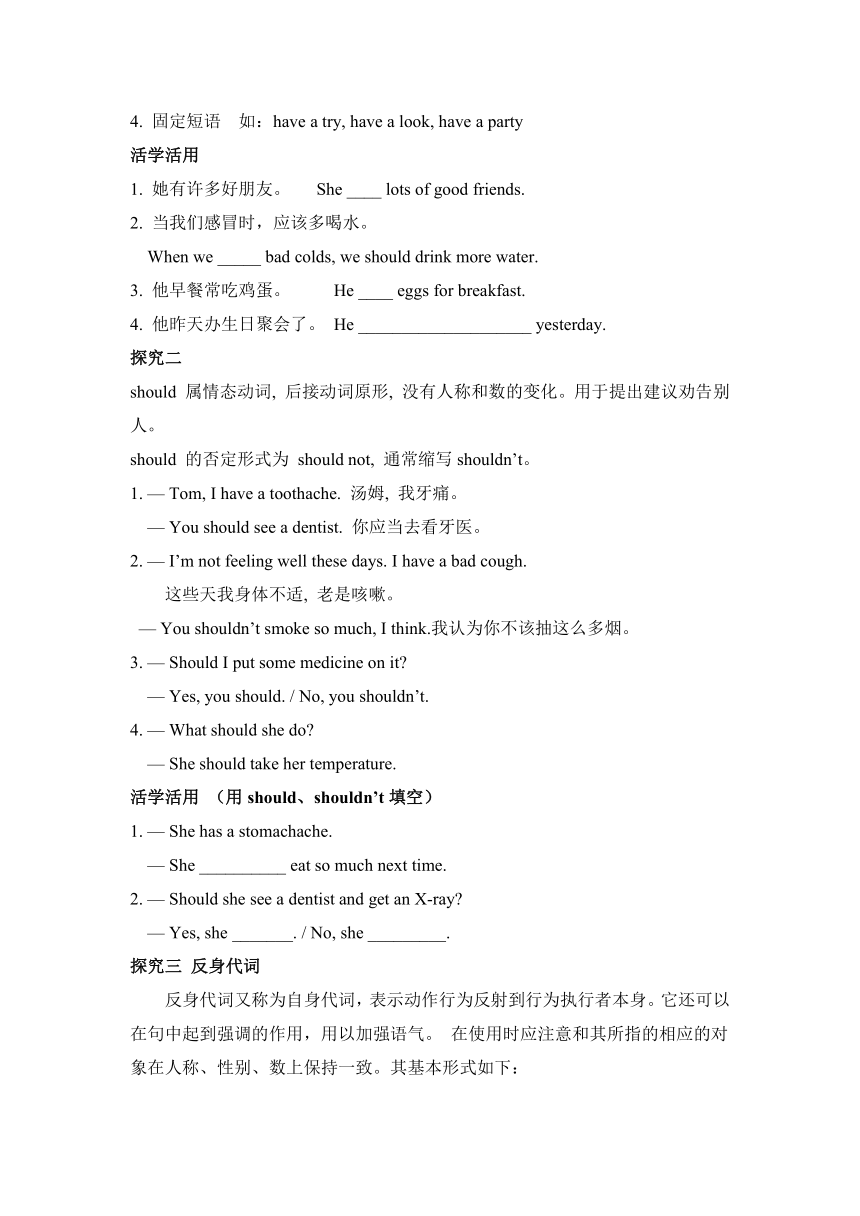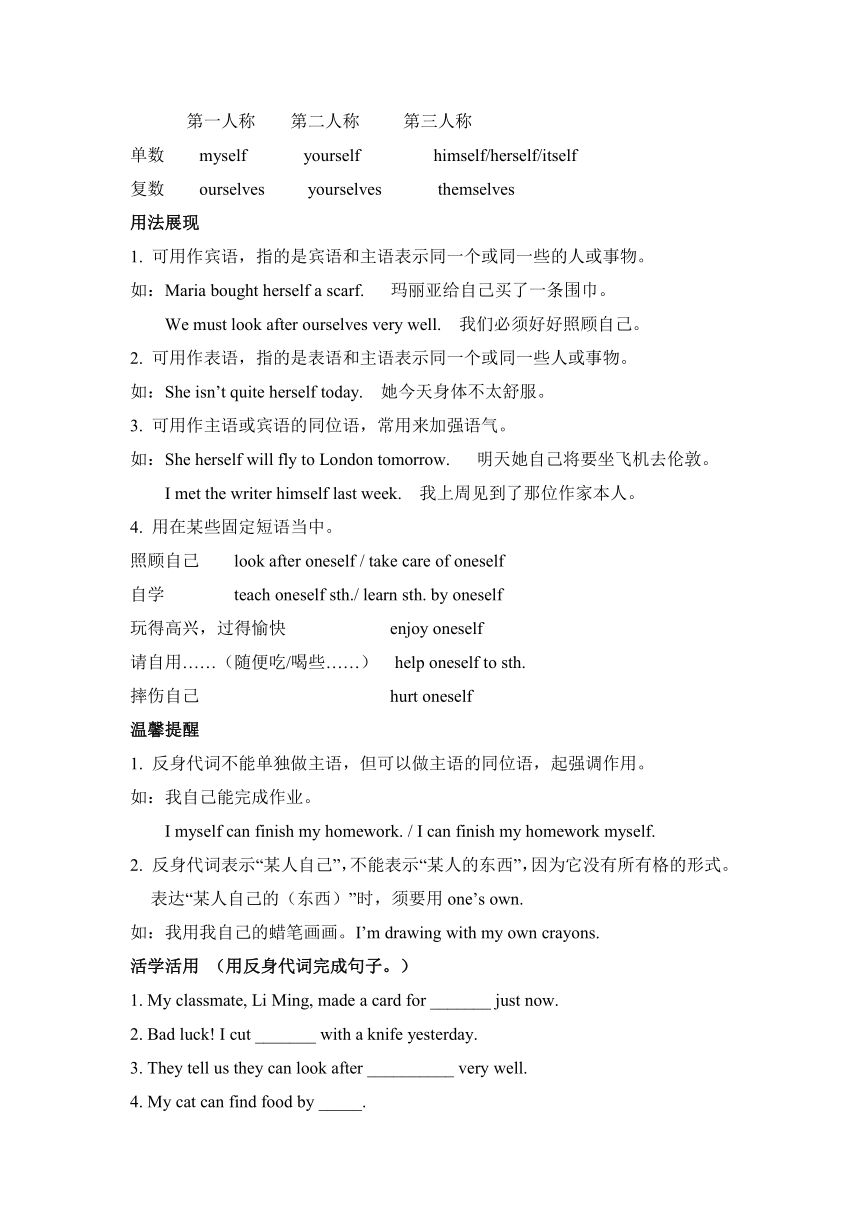人教版八年级下册Unit 1 What's the matter?Section A 3 (Grammar Focus-4c) 导学案(含答案)
文档属性
| 名称 | 人教版八年级下册Unit 1 What's the matter?Section A 3 (Grammar Focus-4c) 导学案(含答案) |

|
|
| 格式 | docx | ||
| 文件大小 | 25.4KB | ||
| 资源类型 | 教案 | ||
| 版本资源 | 人教新目标(Go for it)版 | ||
| 科目 | 英语 | ||
| 更新时间 | 2023-02-09 00:00:00 | ||
图片预览




文档简介
Section A 3 (Grammar Focus-4c)
【学习目标】
理解并掌握下列词汇及短语:
New word: herself
Key phrases: give advice, fall down, cut herself, hurt oneself, get some rest,
2. 理解并掌握下列重点句型:
-Did you hurt yourself playing soccer -No, I didn’t.
-Did you fall down -Yes, I did.
3. Grammar: 反身代词和情态动词should的用法
4. 能对他人建议做出适当的反应。
5. 能主动关心身体不适的人并给予适当的建议
【重点和难点】
重点: Grammar Focus
难点: 主动关心身体不适的人并给予适当的建议
【课前预习】
1.自主学习Grammar Focus。
(1) Ben怎么了 What’s with Ben
(2) 他伤着了自己。他背疼。
He . He a sore back.
(3) 他应该躺下来休息。
He lie down and rest.
(4) 你发烧了吗
Do you
(5) 她应该干什么
What she
(6) 她应该量体温。
She her temperature.
(7) 我应该在上面敷一些药吗
put some medicine on it
反身代词
反身代词 第一人称 第二人称 第三人称
单数
复数
【合作探究】
1. 熟记Grammar focus
2. 总结:
(1) 如何询问某人的健康问题或遇到的麻烦:
What’s the matter (with...) I have a...
He hurt himself and he has a sore back.
Do you have a... Yes, I do./ No, I don’t.
Does he/she have a... Yes, he/she does. No, he/she doesn’t.
(2) 如何征求或提建议:
What should...do ...should/shouldn’t + v....
Should...+v.... Yes,...should./No,...shouldn’t
探究一
读以下四个句子,总结have/has的用法。
I have a bag.
He has noodles for breakfast.
I have a bad cold.
They have a look at the picture.
用法展现
作“有”讲。
如:I have a bag. 我有一个包。
He has a red cup. 他有一个红杯子。
2. 作“吃、喝”讲。如:
have breakfast (吃早饭) have tea (喝茶)
have a biscuit (吃块饼干) have a drink (喝点东西)
3. 作“患病”讲。 如:have a cold, have a fever
4. 固定短语 如:have a try, have a look, have a party
活学活用
1. 她有许多好朋友。 She ____ lots of good friends.
2. 当我们感冒时,应该多喝水。
When we _____ bad colds, we should drink more water.
3. 他早餐常吃鸡蛋。 He ____ eggs for breakfast.
4. 他昨天办生日聚会了。 He ____________________ yesterday.
探究二
should 属情态动词, 后接动词原形, 没有人称和数的变化。用于提出建议劝告别人。
should 的否定形式为 should not, 通常缩写shouldn’t。
1. — Tom, I have a toothache. 汤姆, 我牙痛。
— You should see a dentist. 你应当去看牙医。
2. — I’m not feeling well these days. I have a bad cough.
这些天我身体不适, 老是咳嗽。
— You shouldn’t smoke so much, I think.我认为你不该抽这么多烟。
3. — Should I put some medicine on it
— Yes, you should. / No, you shouldn’t.
4. — What should she do
— She should take her temperature.
活学活用 (用should、shouldn’t填空)
1. — She has a stomachache.
— She __________ eat so much next time.
2. — Should she see a dentist and get an X-ray
— Yes, she _______. / No, she _________.
探究三 反身代词
反身代词又称为自身代词,表示动作行为反射到行为执行者本身。它还可以在句中起到强调的作用,用以加强语气。 在使用时应注意和其所指的相应的对象在人称、性别、数上保持一致。其基本形式如下:
第一人称 第二人称 第三人称
单数 myself yourself himself/herself/itself
复数 ourselves yourselves themselves
用法展现
1. 可用作宾语,指的是宾语和主语表示同一个或同一些的人或事物。
如:Maria bought herself a scarf. 玛丽亚给自己买了一条围巾。
We must look after ourselves very well. 我们必须好好照顾自己。
2. 可用作表语,指的是表语和主语表示同一个或同一些人或事物。
如:She isn’t quite herself today. 她今天身体不太舒服。
3. 可用作主语或宾语的同位语,常用来加强语气。
如:She herself will fly to London tomorrow. 明天她自己将要坐飞机去伦敦。
I met the writer himself last week. 我上周见到了那位作家本人。
4. 用在某些固定短语当中。
照顾自己 look after oneself / take care of oneself
自学 teach oneself sth./ learn sth. by oneself
玩得高兴,过得愉快 enjoy oneself
请自用……(随便吃/喝些……) help oneself to sth.
摔伤自己 hurt oneself
温馨提醒
1. 反身代词不能单独做主语,但可以做主语的同位语,起强调作用。
如:我自己能完成作业。
I myself can finish my homework. / I can finish my homework myself.
2. 反身代词表示“某人自己”,不能表示“某人的东西”,因为它没有所有格的形式。表达“某人自己的(东西)”时,须要用one’s own.
如:我用我自己的蜡笔画画。I’m drawing with my own crayons.
活学活用 (用反身代词完成句子。)
1. My classmate, Li Ming, made a card for _______ just now.
2. Bad luck! I cut _______ with a knife yesterday.
3. They tell us they can look after __________ very well.
4. My cat can find food by _____.
5. Help __________ to some beef, boys.
6. One boy hurt ________ in P.E. class.
7. Jenny cut ______when cooking dinner.
8. Liu Peng, did you hurt ______playing soccer
9. We may hurt_______ when we climb mountains.
10. I'm not quite _______these days.
Practice
Task 1: Work on 4a. Fill in the blanks and practice the conversations.
1. A: I hurt ______ when I played basketball yesterday. What _______ I do
B: You ______ see a doctor and get an X-ray.
2. A: _______ the matter
B: My sister and I ____ sore throats. ____ we go to school
A: No, you _________.
3. A: _____ Mike _____ a fever
B: No, he ________. He ____ a stomachache.
A: He _______ drink some hot tea.
Task 2: Work on 4b.Circle the best advice for these health problems. Then add your own advice.
1. Jenny cut herself.
She should (get an X-ray / put some medicine on the cut).
My advice: _______________________.
2. Kate has a toothache.
She should (see a dentist / get some sleep).
My advice: ________________________.
3. Mary and Sue have colds.
They shouldn’t (sleep/ exercise).
My advice: ______________________.
4. Bob has a sore back.
He should (lie down and rest / take his temperature).
My advice: ______________________.
Task 3: Work on 4c.One student mimes a problem. The other students guess the problem and give advice. Like:
A: What’s the matter Did you hurt yourself playing soccer
B: No, I didn’t.
C: Did you fall down
B: Yes, I did.
D: You should go home and get some rest.
【课时小结】
本节课我们学习了反身代词和情态动词should的用法以及如何针对他人建议做出适当的反应。
【达标检测】
I选择填空
1. A country has dreams. We teenagers _____ also have dreams. With dreams and hard work, anything wonderful can be created.
A. may B. must C. should
2. You ______ drive your car so fast. It’s very dangerous.
A. wouldn’t B. shouldn’t C. couldn’t
3. Your hair is too long. I think you ______ get it cut.
A. should B. could C. will
4. In order to speak English better, we _______ be afraid of losing face.
A. should B. shouldn’t C. must
5. —Hi, guys. How was your party yesterday
—Wonderful! We had a big meal and enjoyed _______.
A. themselves B. myself C. ourselves
II 根据汉语用正确的反身代词填空
6. He was a doctor. 他本人就是一名医生。
7. We are too young to look after .
我们太小了,还不会照顾自己。
He cut when he was cooking. 他做饭的时候割伤了自己。
They taught French. 他们自学法语。
10. That poor boy was . 那个可怜的孩子就是我自己。
11. I'll be again in no time. 我一会儿就会好的。
12. He doesn't feel today. 他今天感觉身体不舒服。
13. I hope you’ll enjoy . 希望你玩得开心。
Please help to some fish.请随你所喜吃点鱼。
She could read by ________ at the age of four. 她在四岁时就能独自看书了。
Ⅲ. 根据汉语意思完成句子
16. 多亏你的帮助,我的房间看起来整洁多了。
, my room looks much tidier.
17. 出乎我的意料, 他通过了测试。
, he passed the exam.
18. 你们在这里踢足球会招来麻烦的。
You will if you play football here.
19. 我们都赞成在学校门口见面。
We all meet at the school gate.
20. 汤姆下了公交车, 走进一家商店。
Tom the bus and walked into a store.
【自我评价】
1. 本课我学会了什么?
___________________________________________________
2. 通过本课的学习,我还有哪些疑问?
___________________________________________________
参考答案:
【课前预习】
(1) the matter (2) hurt himself, has (3) should (4) have a fever
(5) should, do (6) should take (7) Should I
2. 反身代词
反身代词 第一人称 第二人称 第三人称
单数 myself yourself himself/herself/itself
复数 ourselves yourselves themselves
【合作探究】
探究一
1. has 2. have 3. has 4. had a birthday party
探究二
1. shouldn’t 2 should, shouldn’t
探究三
1. himself 2. myself 3. themselves 4. itself 5. yourselves
6. himself 7. herself 8. yourself 9. ourselves 10. myself
Practice
Task 1: 1. myself, should, should 2. What’s, have, Should, shouldn’t
3. Does, have, doesn’t, has, should
Task 2: 1. put some medicine on the cut
2. see a dentist 3. exercise 4. lie down and rest
【达标检测】
I. 1-5 CBABC
II. 6. himself 7. ourselves 8. himself 9. themselves 10. myself
11. myself 12. himself 13. yourself 14. yourself 15. herself
Ⅲ. 16. Thanks to your help 17. To my surprise
18. get into trouble 19. agree(d) to 20. got off
【学习目标】
理解并掌握下列词汇及短语:
New word: herself
Key phrases: give advice, fall down, cut herself, hurt oneself, get some rest,
2. 理解并掌握下列重点句型:
-Did you hurt yourself playing soccer -No, I didn’t.
-Did you fall down -Yes, I did.
3. Grammar: 反身代词和情态动词should的用法
4. 能对他人建议做出适当的反应。
5. 能主动关心身体不适的人并给予适当的建议
【重点和难点】
重点: Grammar Focus
难点: 主动关心身体不适的人并给予适当的建议
【课前预习】
1.自主学习Grammar Focus。
(1) Ben怎么了 What’s with Ben
(2) 他伤着了自己。他背疼。
He . He a sore back.
(3) 他应该躺下来休息。
He lie down and rest.
(4) 你发烧了吗
Do you
(5) 她应该干什么
What she
(6) 她应该量体温。
She her temperature.
(7) 我应该在上面敷一些药吗
put some medicine on it
反身代词
反身代词 第一人称 第二人称 第三人称
单数
复数
【合作探究】
1. 熟记Grammar focus
2. 总结:
(1) 如何询问某人的健康问题或遇到的麻烦:
What’s the matter (with...) I have a...
He hurt himself and he has a sore back.
Do you have a... Yes, I do./ No, I don’t.
Does he/she have a... Yes, he/she does. No, he/she doesn’t.
(2) 如何征求或提建议:
What should...do ...should/shouldn’t + v....
Should...+v.... Yes,...should./No,...shouldn’t
探究一
读以下四个句子,总结have/has的用法。
I have a bag.
He has noodles for breakfast.
I have a bad cold.
They have a look at the picture.
用法展现
作“有”讲。
如:I have a bag. 我有一个包。
He has a red cup. 他有一个红杯子。
2. 作“吃、喝”讲。如:
have breakfast (吃早饭) have tea (喝茶)
have a biscuit (吃块饼干) have a drink (喝点东西)
3. 作“患病”讲。 如:have a cold, have a fever
4. 固定短语 如:have a try, have a look, have a party
活学活用
1. 她有许多好朋友。 She ____ lots of good friends.
2. 当我们感冒时,应该多喝水。
When we _____ bad colds, we should drink more water.
3. 他早餐常吃鸡蛋。 He ____ eggs for breakfast.
4. 他昨天办生日聚会了。 He ____________________ yesterday.
探究二
should 属情态动词, 后接动词原形, 没有人称和数的变化。用于提出建议劝告别人。
should 的否定形式为 should not, 通常缩写shouldn’t。
1. — Tom, I have a toothache. 汤姆, 我牙痛。
— You should see a dentist. 你应当去看牙医。
2. — I’m not feeling well these days. I have a bad cough.
这些天我身体不适, 老是咳嗽。
— You shouldn’t smoke so much, I think.我认为你不该抽这么多烟。
3. — Should I put some medicine on it
— Yes, you should. / No, you shouldn’t.
4. — What should she do
— She should take her temperature.
活学活用 (用should、shouldn’t填空)
1. — She has a stomachache.
— She __________ eat so much next time.
2. — Should she see a dentist and get an X-ray
— Yes, she _______. / No, she _________.
探究三 反身代词
反身代词又称为自身代词,表示动作行为反射到行为执行者本身。它还可以在句中起到强调的作用,用以加强语气。 在使用时应注意和其所指的相应的对象在人称、性别、数上保持一致。其基本形式如下:
第一人称 第二人称 第三人称
单数 myself yourself himself/herself/itself
复数 ourselves yourselves themselves
用法展现
1. 可用作宾语,指的是宾语和主语表示同一个或同一些的人或事物。
如:Maria bought herself a scarf. 玛丽亚给自己买了一条围巾。
We must look after ourselves very well. 我们必须好好照顾自己。
2. 可用作表语,指的是表语和主语表示同一个或同一些人或事物。
如:She isn’t quite herself today. 她今天身体不太舒服。
3. 可用作主语或宾语的同位语,常用来加强语气。
如:She herself will fly to London tomorrow. 明天她自己将要坐飞机去伦敦。
I met the writer himself last week. 我上周见到了那位作家本人。
4. 用在某些固定短语当中。
照顾自己 look after oneself / take care of oneself
自学 teach oneself sth./ learn sth. by oneself
玩得高兴,过得愉快 enjoy oneself
请自用……(随便吃/喝些……) help oneself to sth.
摔伤自己 hurt oneself
温馨提醒
1. 反身代词不能单独做主语,但可以做主语的同位语,起强调作用。
如:我自己能完成作业。
I myself can finish my homework. / I can finish my homework myself.
2. 反身代词表示“某人自己”,不能表示“某人的东西”,因为它没有所有格的形式。表达“某人自己的(东西)”时,须要用one’s own.
如:我用我自己的蜡笔画画。I’m drawing with my own crayons.
活学活用 (用反身代词完成句子。)
1. My classmate, Li Ming, made a card for _______ just now.
2. Bad luck! I cut _______ with a knife yesterday.
3. They tell us they can look after __________ very well.
4. My cat can find food by _____.
5. Help __________ to some beef, boys.
6. One boy hurt ________ in P.E. class.
7. Jenny cut ______when cooking dinner.
8. Liu Peng, did you hurt ______playing soccer
9. We may hurt_______ when we climb mountains.
10. I'm not quite _______these days.
Practice
Task 1: Work on 4a. Fill in the blanks and practice the conversations.
1. A: I hurt ______ when I played basketball yesterday. What _______ I do
B: You ______ see a doctor and get an X-ray.
2. A: _______ the matter
B: My sister and I ____ sore throats. ____ we go to school
A: No, you _________.
3. A: _____ Mike _____ a fever
B: No, he ________. He ____ a stomachache.
A: He _______ drink some hot tea.
Task 2: Work on 4b.Circle the best advice for these health problems. Then add your own advice.
1. Jenny cut herself.
She should (get an X-ray / put some medicine on the cut).
My advice: _______________________.
2. Kate has a toothache.
She should (see a dentist / get some sleep).
My advice: ________________________.
3. Mary and Sue have colds.
They shouldn’t (sleep/ exercise).
My advice: ______________________.
4. Bob has a sore back.
He should (lie down and rest / take his temperature).
My advice: ______________________.
Task 3: Work on 4c.One student mimes a problem. The other students guess the problem and give advice. Like:
A: What’s the matter Did you hurt yourself playing soccer
B: No, I didn’t.
C: Did you fall down
B: Yes, I did.
D: You should go home and get some rest.
【课时小结】
本节课我们学习了反身代词和情态动词should的用法以及如何针对他人建议做出适当的反应。
【达标检测】
I选择填空
1. A country has dreams. We teenagers _____ also have dreams. With dreams and hard work, anything wonderful can be created.
A. may B. must C. should
2. You ______ drive your car so fast. It’s very dangerous.
A. wouldn’t B. shouldn’t C. couldn’t
3. Your hair is too long. I think you ______ get it cut.
A. should B. could C. will
4. In order to speak English better, we _______ be afraid of losing face.
A. should B. shouldn’t C. must
5. —Hi, guys. How was your party yesterday
—Wonderful! We had a big meal and enjoyed _______.
A. themselves B. myself C. ourselves
II 根据汉语用正确的反身代词填空
6. He was a doctor. 他本人就是一名医生。
7. We are too young to look after .
我们太小了,还不会照顾自己。
He cut when he was cooking. 他做饭的时候割伤了自己。
They taught French. 他们自学法语。
10. That poor boy was . 那个可怜的孩子就是我自己。
11. I'll be again in no time. 我一会儿就会好的。
12. He doesn't feel today. 他今天感觉身体不舒服。
13. I hope you’ll enjoy . 希望你玩得开心。
Please help to some fish.请随你所喜吃点鱼。
She could read by ________ at the age of four. 她在四岁时就能独自看书了。
Ⅲ. 根据汉语意思完成句子
16. 多亏你的帮助,我的房间看起来整洁多了。
, my room looks much tidier.
17. 出乎我的意料, 他通过了测试。
, he passed the exam.
18. 你们在这里踢足球会招来麻烦的。
You will if you play football here.
19. 我们都赞成在学校门口见面。
We all meet at the school gate.
20. 汤姆下了公交车, 走进一家商店。
Tom the bus and walked into a store.
【自我评价】
1. 本课我学会了什么?
___________________________________________________
2. 通过本课的学习,我还有哪些疑问?
___________________________________________________
参考答案:
【课前预习】
(1) the matter (2) hurt himself, has (3) should (4) have a fever
(5) should, do (6) should take (7) Should I
2. 反身代词
反身代词 第一人称 第二人称 第三人称
单数 myself yourself himself/herself/itself
复数 ourselves yourselves themselves
【合作探究】
探究一
1. has 2. have 3. has 4. had a birthday party
探究二
1. shouldn’t 2 should, shouldn’t
探究三
1. himself 2. myself 3. themselves 4. itself 5. yourselves
6. himself 7. herself 8. yourself 9. ourselves 10. myself
Practice
Task 1: 1. myself, should, should 2. What’s, have, Should, shouldn’t
3. Does, have, doesn’t, has, should
Task 2: 1. put some medicine on the cut
2. see a dentist 3. exercise 4. lie down and rest
【达标检测】
I. 1-5 CBABC
II. 6. himself 7. ourselves 8. himself 9. themselves 10. myself
11. myself 12. himself 13. yourself 14. yourself 15. herself
Ⅲ. 16. Thanks to your help 17. To my surprise
18. get into trouble 19. agree(d) to 20. got off
同课章节目录
- Unit 1 What's the matter?
- Section A
- Section B
- Unit 2 I'll help to clean up the city parks.
- Section A
- Section B
- Unit 3 Could you please clean your room?
- Section A
- Section B
- Unit 4 Why don't you talk to your parents?
- Section A
- Section B
- Unit 5 What were you doing when the rainstorm came
- Section A
- Section B
- Review of Units 1-5
- Unit 6 An old man tried to move the mountains.
- Section A
- Section B
- Unit 7 What's the highest mountain in the world?
- Section A
- Section B
- Unit 8 Have you read Treasure Island yet?
- Section A
- Section B
- Unit 9 Have you ever been to a museum?
- Section A
- Section B
- Unit 10 I've had this bike for three years.
- Section A
- Section B
